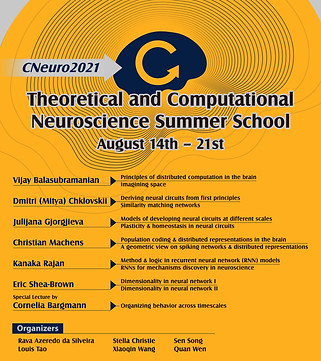
Theoretical and Computational Neuroscience Summer School
Event History & Material
CNeuro2025
CNeuro2025 was a one-week summer school from August 16 to August 23, which in collaboration with the Institute of Neuroscience took place for the first time in Shanghai, China.
CNeuro2022
CNeuro2022 was a one-week summer school, which took place in a hybrid version; lectures held in Basel were transmitted to Beijing via Zoom, and lectures in Beijing were similarly transmitted to Basel. The course brought together 22 students from many different countries around the world, such as Australia, Israel and the USA.
CNeuro2024
CNeuro2024 was a one-week summer school, which took place at the Tsinghua University in Beijing, China.
The main theme of this summer school was "Neural Coding, Learning and Decision-Making".
CNeuro2021
CNeuro2021 introduced students with a strong quantitative background (e.g., mathematics, theoretical physics, computer science and engineering) to the emerging field of theoretical and computational neuroscience. The course brought together leading scientists in theoretical and computational neuroscience. The vision was that of a collaborative environment where faculty and students could have in-depth discussions on topics in the frontier of neuroscience. The course represented a pedagogical basis for new students, introducing them to advanced mathematical methods and modelling approaches that are now being used and developed to understand brain functions.
CNeuro2020
CNeuro2020 was the first online-only summer school, with participants from over 20 countries, and lectures given in three different time zones.
With travel restrictions implemented all over the world, this year's challenge of bringing together leading research scientists and students from various backgrounds was bigger than ever. The result was a week-long successful collaboration between the organizers, 14 expert lecturers from highly acclaimed institutions, and around 60 students from over 50 universities, all of it on a virtual platform.
CNeuro2019
In this two-week summer school, our aim was to introduce students with a strong quantitative background (e.g., mathematics, theoretical physics, computer science and engineering) to the emerging field of theoretical and computational neuroscience. The course brought together leading scientists in theoretical and computational neuroscience. The vision was that of a collaborative environment where faculty and students could have in-depth discussions on topics in the frontier of neuroscience. The course represented a pedagogical basis for new students, introducing them to advanced mathematical methods and modelling approaches that are now being used and developed to understand brain functions.
CNeuro2018
The 1st Computational Neuroscience and Brain-inspired Intelligence Summer School organized by THBI was held during the first two weeks of July at Tsinghua University, Beijing, China. The purpose of this summer school was to introduce experimental neuroscience researchers to the computational methods and to foster researchers proficient both in the language of neuroscience and artificial intelligence research. The lectures introduced the basic concepts and methods in experimental data analysis, theoretical models, and machine learning, supplemented with special lectures by invited speakers on advanced topics from world renowned researchers in related fields.
Testimonials
Here is What the Participants of Previous
CNeuro Summer Schools Had to Say
"Study at CNeuro Summer School is an invaluable opportunity to gain creditable experience in the field of computational neuroscience at one of the world's famous and well-respected institutions. In there, you could not only gain what you want to learn, but meet many excellent researchers and students!"
"Wonderful lecturers and a friendly, inclusive atmosphere."
"If you're a student majoring in neuroscience, spending most of your time doing the experiment but you're quite interested in underlying computation principles, please don't hesitate to come here to 'remodel' your thoughts from other fields on which we have the same goal."
"CNeuro is the best summer school I have ever attend and I hope it could also be everyone else's who are interested in neuroscience."
"The CNeuro Summer School offered me the opportunity to hear from leading scientists in a broad range of research topics in computational neuroscience. It helped me to have a clearer view of what is currently being studied in the field and gave me new insights for my own research."






